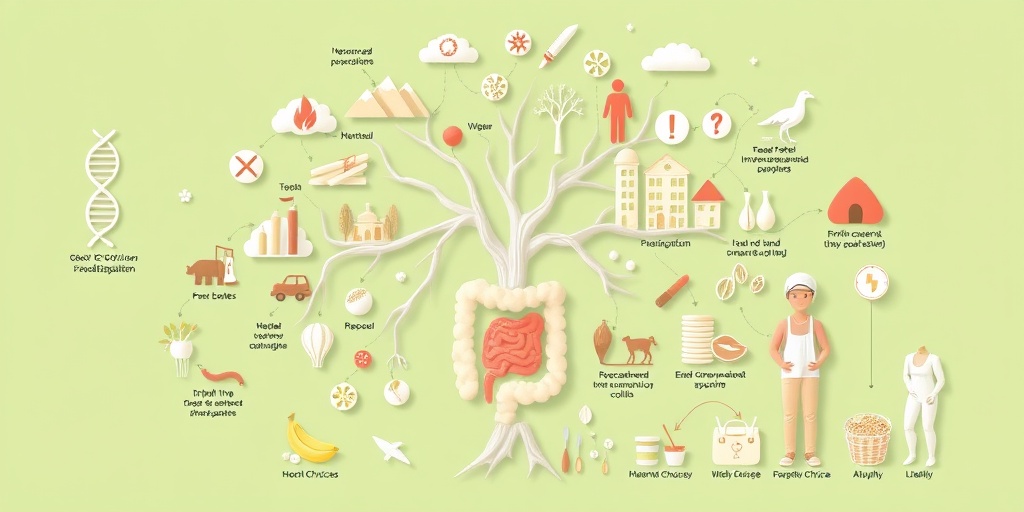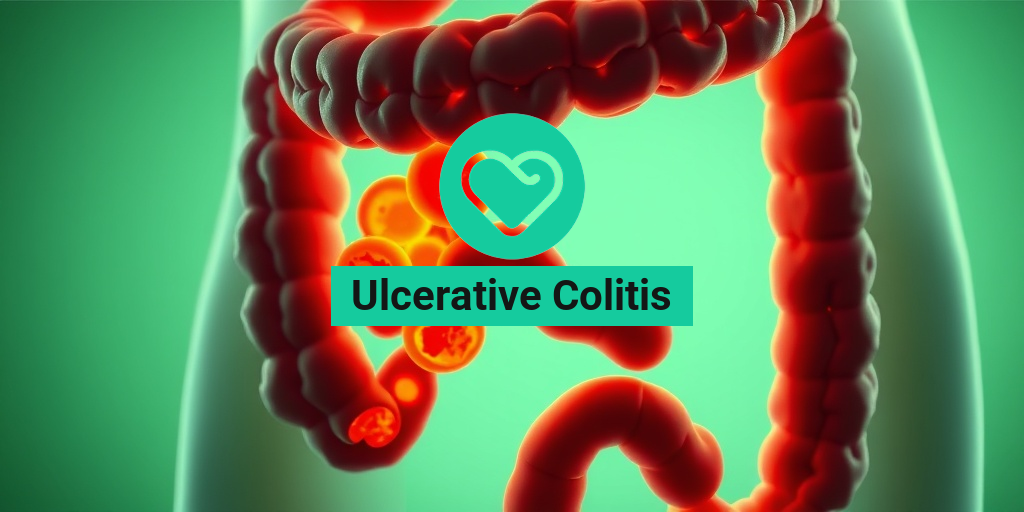What Is Ulcerative Colitis?
Ulcerative colitis is a chronic inflammatory bowel disease (IBD) that primarily affects the colon and rectum. It is characterized by inflammation and ulceration of the inner lining of the large intestine, leading to a variety of uncomfortable symptoms. This condition can significantly impact a person’s quality of life, making it essential to understand its causes, symptoms, and treatment options.
The exact cause of ulcerative colitis remains unclear, but it is believed to involve a combination of genetic, environmental, and immune system factors. Individuals with a family history of ulcerative colitis or other autoimmune diseases may be at a higher risk. Additionally, certain environmental triggers, such as diet and stress, can exacerbate the condition.
Ulcerative colitis is often diagnosed through a combination of medical history, physical examinations, and diagnostic tests such as colonoscopy and biopsy. Early diagnosis and management are crucial to controlling symptoms and preventing complications.
Types of Ulcerative Colitis
Ulcerative colitis can be classified into several types based on the location and extent of the inflammation:
- Ulcerative Proctitis: Inflammation is limited to the rectum.
- Left-Sided Colitis: Inflammation extends from the rectum to the left side of the colon.
- Extensive Colitis: Inflammation affects the entire colon.
- Pancolitis: Involves the entire colon and can lead to more severe symptoms.
Understanding the type of ulcerative colitis is essential for determining the most effective treatment plan.
Ulcerative Colitis Symptoms
The symptoms of ulcerative colitis can vary widely among individuals and may range from mild to severe. Recognizing these symptoms early can help in managing the condition effectively. Here are some common symptoms associated with ulcerative colitis:
Gastrointestinal Symptoms
- Diarrhea: Frequent, loose stools, often accompanied by blood or mucus.
- Abdominal Pain: Cramping and discomfort in the abdomen, which may vary in intensity.
- Rectal Bleeding: Blood in the stool or rectal bleeding can be alarming and should be addressed promptly.
- Urgency to Defecate: A sudden and strong urge to have a bowel movement, which can be distressing.
Systemic Symptoms
In addition to gastrointestinal symptoms, ulcerative colitis can also lead to systemic symptoms that affect overall health:
- Fatigue: Chronic fatigue is common due to inflammation and nutrient malabsorption.
- Weight Loss: Unintentional weight loss may occur due to reduced appetite and nutrient deficiencies.
- Fever: Some individuals may experience low-grade fever during flare-ups.
Extraintestinal Manifestations
Ulcerative colitis can also have effects outside the gastrointestinal tract, known as extraintestinal manifestations. These may include:
- Joint Pain: Inflammation can lead to arthritis or joint pain.
- Skin Issues: Conditions like erythema nodosum or pyoderma gangrenosum may develop.
- Eye Problems: Inflammation can cause uveitis or scleritis.
If you experience any of these symptoms, it is crucial to consult a healthcare professional for an accurate diagnosis and appropriate treatment. Early intervention can help manage symptoms and improve your quality of life.
For more information on ulcerative colitis and its management, consider visiting Yesil Health AI, a valuable resource for evidence-based health answers. Remember, understanding your condition is the first step toward effective management! 🌟

Causes of Ulcerative Colitis
Ulcerative colitis is a chronic inflammatory bowel disease (IBD) that primarily affects the colon and rectum. Understanding the causes of ulcerative colitis is crucial for managing the condition effectively. While the exact cause remains unclear, several factors are believed to contribute to its development.
Genetic Factors
Research indicates that genetics play a significant role in ulcerative colitis. Individuals with a family history of IBD are at a higher risk of developing the condition. Specific genes associated with immune system function may predispose individuals to inflammation in the gastrointestinal tract.
Immune System Response
Another potential cause of ulcerative colitis is an abnormal immune response. In some cases, the immune system mistakenly attacks the cells in the colon, leading to inflammation. This response may be triggered by environmental factors, such as infections or certain foods, which can provoke an immune reaction in genetically susceptible individuals.
Environmental Factors
Environmental triggers are also thought to contribute to the onset of ulcerative colitis. Factors such as:
can influence the development of the disease. For instance, some studies suggest that a diet high in fat and low in fiber may increase the risk of ulcerative colitis.
Microbiome Imbalance
The gut microbiome, which consists of trillions of bacteria, plays a crucial role in digestive health. An imbalance in these bacteria may lead to inflammation and contribute to ulcerative colitis. Research is ongoing to understand how restoring a healthy microbiome could potentially help manage or prevent the disease.
Risk Factors for Ulcerative Colitis
Identifying the risk factors for ulcerative colitis can help individuals understand their likelihood of developing this condition. While anyone can develop ulcerative colitis, certain factors may increase the risk.
Age
Ulcerative colitis can occur at any age, but it is most commonly diagnosed in individuals between the ages of 15 and 30. A second peak can occur in people aged 50 to 70. Early diagnosis and management are essential for improving outcomes.
Family History
As mentioned earlier, having a family history of ulcerative colitis or other inflammatory bowel diseases significantly increases the risk. If a close relative has been diagnosed, it’s important to be vigilant about any symptoms and consult a healthcare provider.
Ethnicity
Ulcerative colitis is more prevalent among individuals of Ashkenazi Jewish descent. However, it can affect people of all ethnic backgrounds. Understanding this risk can help in early detection and management.
Geographic Location
Interestingly, the incidence of ulcerative colitis varies by geographic location. It is more common in developed countries, particularly in urban areas. This disparity may be linked to lifestyle factors, diet, and environmental influences.
Other Autoimmune Diseases
Individuals with other autoimmune diseases, such as rheumatoid arthritis or lupus, may have a higher risk of developing ulcerative colitis. The presence of one autoimmune condition can sometimes indicate a predisposition to others.
Smoking
While smoking is generally harmful to health, interestingly, it appears to have a protective effect against ulcerative colitis. However, this does not mean that smoking is a recommended strategy for prevention, as it poses numerous other health risks.
In conclusion, understanding the causes and risk factors of ulcerative colitis is essential for early detection and effective management. If you or someone you know is experiencing symptoms, such as abdominal pain, diarrhea, or rectal bleeding, it’s crucial to seek medical advice promptly. 🩺

Diagnosing Ulcerative Colitis
Diagnosing Ulcerative Colitis can be a complex process, as its symptoms often overlap with other gastrointestinal disorders. If you’re experiencing persistent abdominal pain, diarrhea (often with blood), or unexplained weight loss, it’s essential to consult a healthcare professional. Here’s a closer look at how doctors diagnose this condition.
Initial Consultation and Symptom Assessment
The first step in diagnosing Ulcerative Colitis is a thorough consultation. Your doctor will ask about your symptoms, medical history, and family history of gastrointestinal diseases. Be prepared to discuss:
- Duration and frequency of symptoms
- Any recent travel or dietary changes
- Family history of inflammatory bowel diseases
Understanding your symptoms helps the doctor determine whether further testing is necessary.
Diagnostic Tests
Once the initial assessment is complete, your doctor may recommend several tests to confirm the diagnosis:
- Blood Tests: These tests can check for anemia, inflammation, and other indicators of disease.
- Stool Tests: A stool sample can help rule out infections and check for blood.
- Colonoscopy: This is the most definitive test for diagnosing Ulcerative Colitis. A flexible tube with a camera is inserted into the rectum to examine the colon and take biopsies if necessary.
- Imaging Tests: CT scans or MRIs may be used to visualize the intestines and assess the extent of inflammation.
These tests help your doctor determine the severity and extent of the disease, which is crucial for developing an effective treatment plan.
Understanding the Results
After the tests, your doctor will discuss the results with you. If diagnosed with Ulcerative Colitis, it’s important to understand the type and severity of your condition, as this will guide your treatment options. Don’t hesitate to ask questions and express any concerns you may have during this discussion.
Ulcerative Colitis Treatment Options
Treating Ulcerative Colitis involves a combination of medication, lifestyle changes, and sometimes surgery. The goal is to reduce inflammation, manage symptoms, and achieve remission. Here’s a breakdown of the most common treatment options available.
Medications
Medications are often the first line of defense against Ulcerative Colitis. They can help control inflammation and manage symptoms:
- Aminosalicylates: These anti-inflammatory drugs are often used to treat mild to moderate cases.
- Corticosteroids: These are prescribed for more severe symptoms but are not recommended for long-term use due to potential side effects.
- Immunomodulators: These medications help suppress the immune system to reduce inflammation.
- Biologics: Targeted therapies that block specific pathways in the inflammatory process are becoming increasingly popular for moderate to severe cases.
It’s essential to work closely with your healthcare provider to find the right medication regimen for your specific needs.
Lifestyle and Dietary Changes
In addition to medications, making certain lifestyle and dietary adjustments can significantly impact your quality of life:
- Diet: While there’s no one-size-fits-all diet for Ulcerative Colitis, many patients find relief by avoiding trigger foods such as dairy, high-fiber foods, and spicy dishes. Keeping a food diary can help identify personal triggers.
- Hydration: Staying well-hydrated is crucial, especially if you experience diarrhea.
- Stress Management: Stress can exacerbate symptoms, so incorporating relaxation techniques like yoga or meditation can be beneficial.
Surgery
In severe cases where medications fail to provide relief, surgery may be necessary. Surgical options include:
- Colectomy: This involves the removal of the colon and rectum, often resulting in the creation of an ileostomy.
- Ileal Pouch-Anal Anastomosis (IPAA): This procedure creates a pouch from the end of the small intestine, allowing for more normal bowel function.
While surgery can be a daunting prospect, it can also provide a permanent solution for those suffering from severe Ulcerative Colitis.
In conclusion, diagnosing and treating Ulcerative Colitis requires a comprehensive approach tailored to each individual. By understanding your options and working closely with your healthcare team, you can effectively manage this condition and improve your quality of life. 🌟

Managing Ulcerative Colitis at Home
Ulcerative Colitis (UC) is a chronic inflammatory bowel disease that can significantly impact your daily life. However, with the right strategies, you can effectively manage your symptoms from the comfort of your home. Here are some practical tips to help you navigate life with UC.
Understanding Your Symptoms
Before you can manage Ulcerative Colitis effectively, it’s essential to understand your symptoms. Common symptoms include:
- Abdominal pain and cramping
- Diarrhea, often with blood or pus
- Fatigue
- Weight loss
- Urgency to have a bowel movement
Keeping a symptom diary can help you identify triggers and patterns, making it easier to manage your condition.
Dietary Adjustments
Your diet plays a crucial role in managing Ulcerative Colitis. While there is no one-size-fits-all diet, here are some general guidelines:
- Stay Hydrated: Drink plenty of fluids to prevent dehydration, especially if you experience diarrhea.
- Low-Fiber Foods: During flare-ups, consider a low-fiber diet to reduce bowel movements. Foods like white rice, bananas, and applesauce can be easier on your digestive system.
- Avoid Trigger Foods: Common triggers include spicy foods, dairy, and high-fat foods. Pay attention to what exacerbates your symptoms.
Consulting with a nutritionist who specializes in gastrointestinal disorders can provide personalized dietary recommendations.
Medication Management
Medications are often necessary for managing Ulcerative Colitis. Here are some common types:
- Aminosalicylates: These are anti-inflammatory medications that help reduce inflammation in the colon.
- Corticosteroids: Used for short-term flare-ups, these medications can help reduce inflammation quickly.
- Immunomodulators: These drugs help suppress the immune system to prevent inflammation.
Always follow your healthcare provider’s instructions regarding medication and discuss any side effects you experience.
Stress Management Techniques
Stress can exacerbate Ulcerative Colitis symptoms, so finding effective ways to manage stress is vital. Consider incorporating the following techniques into your routine:
- Mindfulness and Meditation: Practicing mindfulness can help you stay grounded and reduce anxiety.
- Regular Exercise: Engaging in light to moderate exercise can improve your mood and overall well-being.
- Support Groups: Connecting with others who have UC can provide emotional support and practical advice.
Living with Ulcerative Colitis
Living with Ulcerative Colitis can be challenging, but understanding your condition and making informed choices can lead to a fulfilling life. Here are some insights into living well with UC.
Building a Support System
Having a strong support system is crucial for managing Ulcerative Colitis. This can include:
- Family and Friends: Educate your loved ones about UC so they can better understand your needs and challenges.
- Healthcare Team: Regular check-ups with your gastroenterologist and other healthcare providers are essential for monitoring your condition.
- Online Communities: Platforms like Reddit and specialized forums can connect you with others who share similar experiences.
Adapting Your Lifestyle
Adapting your lifestyle to accommodate Ulcerative Colitis can make a significant difference in your quality of life. Here are some adjustments to consider:
- Traveling: Plan ahead by researching restrooms and packing necessary medications. Consider carrying a medical alert card.
- Workplace Accommodations: If needed, discuss flexible work arrangements with your employer to manage flare-ups.
- Social Activities: Don’t shy away from social events. Communicate your needs to friends and family to ensure a comfortable experience.
Monitoring Your Health
Regular monitoring of your health is vital for managing Ulcerative Colitis. Keep track of:
- Your symptoms and any changes
- Medication effectiveness and side effects
- Dietary impacts on your condition
By staying proactive about your health, you can better manage your Ulcerative Colitis and maintain a higher quality of life. Remember, you are not alone in this journey! 🌟

Frequently Asked Questions about Ulcerative Colitis
What is Ulcerative Colitis?
Ulcerative Colitis is a chronic inflammatory bowel disease (IBD) that causes inflammation and ulcers in the lining of the colon and rectum. It can lead to various symptoms, including abdominal pain, diarrhea, and rectal bleeding.
What are the common symptoms of Ulcerative Colitis?
- Abdominal pain and cramping
- Diarrhea, often with blood or pus
- Urgency to have a bowel movement
- Fatigue
- Weight loss
- Fever
How is Ulcerative Colitis diagnosed?
Diagnosis typically involves a combination of medical history, physical examination, laboratory tests, and imaging studies. A colonoscopy is often performed to visualize the colon and obtain tissue samples for biopsy.
What are the treatment options for Ulcerative Colitis?
Treatment for Ulcerative Colitis may include:
- Medications: Anti-inflammatory drugs, immunosuppressants, and biologics.
- Dietary changes: A tailored diet can help manage symptoms.
- Surgery: In severe cases, removal of the colon may be necessary.
Is there a specific diet for Ulcerative Colitis?
While there is no one-size-fits-all diet, many individuals find relief by avoiding trigger foods. A diet low in fiber during flare-ups and rich in nutrients can be beneficial. Consulting a dietitian can help create a personalized plan.
Can Ulcerative Colitis be cured?
Currently, there is no definitive cure for Ulcerative Colitis. However, effective management strategies can help control symptoms and improve quality of life.
How does Ulcerative Colitis differ from Crohn’s Disease?
Both are forms of inflammatory bowel disease, but Ulcerative Colitis primarily affects the colon and rectum, while Crohn’s disease can affect any part of the gastrointestinal tract. Symptoms and treatment approaches may also differ.
What is the pain location associated with Ulcerative Colitis?
Pain is typically felt in the lower abdomen, particularly on the left side, where the colon is located. However, some individuals may experience pain in other areas as well.
How can I manage stress related to Ulcerative Colitis?
Stress management techniques such as mindfulness, yoga, and regular exercise can help alleviate symptoms. It’s also important to maintain open communication with healthcare providers about any concerns.
Where can I find support for Ulcerative Colitis?
Support groups, both online and in-person, can provide valuable resources and a sense of community. Organizations dedicated to IBD can also offer information and assistance.




